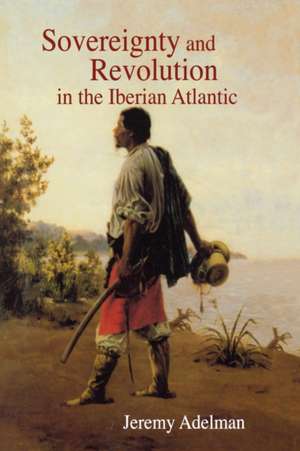Sovereignty and Revolution in the Iberian Atlantic
Autor Jeremy Adelmanen Limba Engleză Paperback – 20 apr 2009
Sovereignty and Revolution in the Iberian Atlantic offers a new understanding of Latin American and Atlantic history, one that blurs traditional distinctions between the "imperial" and the "colonial." It shows how the Spanish and Portuguese empires responded to the pressures of rival states and merchant capitalism in the eighteenth century. As empires adapted, the ties between colonies and mother countries transformed, recreating trans-Atlantic bonds of loyalty and interests. In the end, colonies repudiated their Iberian loyalties not so much because they sought independent nationhood. Rather, as European conflicts and revolutions swept across the Atlantic, empires were no longer viable models of sovereignty--and there was less to be loyal to. The Old Regimes collapsed before subjects began to imagine new ones in their place. The emergence of Latin American nations--indeed many of our contemporary notions of sovereignty--was the effect, and not the cause, of the breakdown of European empires.
Preț: 338.72 lei
Nou
Puncte Express: 508
Preț estimativ în valută:
64.82€ • 67.43$ • 53.51£
64.82€ • 67.43$ • 53.51£
Carte tipărită la comandă
Livrare economică 14-28 aprilie
Preluare comenzi: 021 569.72.76
Specificații
ISBN-13: 9780691142777
ISBN-10: 0691142777
Pagini: 408
Ilustrații: 5 halftones. 1 table.
Dimensiuni: 156 x 232 x 27 mm
Greutate: 0.59 kg
Editura: Princeton University Press
Locul publicării:Princeton, United States
ISBN-10: 0691142777
Pagini: 408
Ilustrații: 5 halftones. 1 table.
Dimensiuni: 156 x 232 x 27 mm
Greutate: 0.59 kg
Editura: Princeton University Press
Locul publicării:Princeton, United States
Notă biografică
Jeremy Adelman is Walter Samuel Carpenter III Professor of Spanish Civilization and Culture, and Chair of the History Department, at Princeton University. His most recent book, Republic of Capital: Buenos Aires and the Legal Transformation of the New World, won the American Historical Association's Atlantic History Prize.
